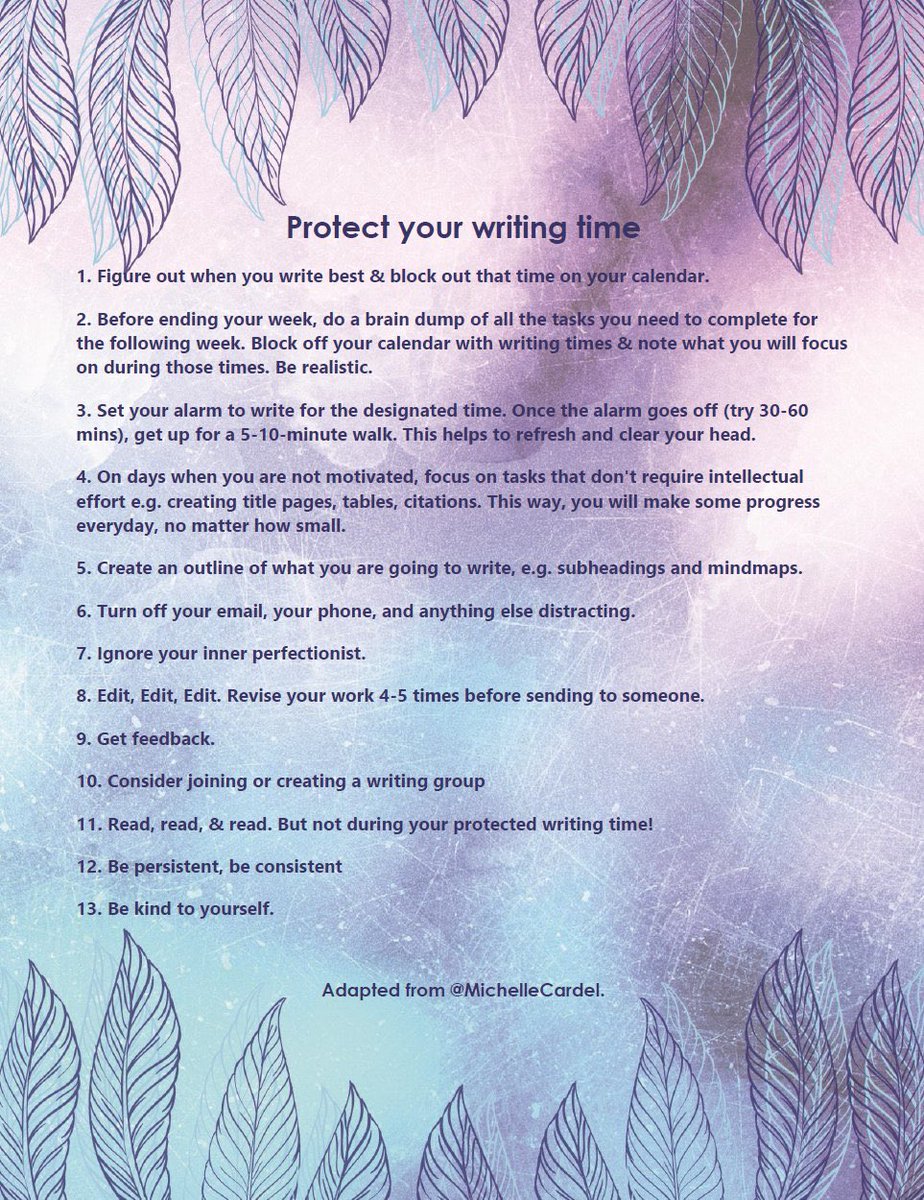#AcademicTwitter: I used to be a horrible scientific writer. I was paralyzed by writing anxiety & it took me FOREVER to write papers. Last year I published 14 scientific articles (8 first, 2 second, 2 senior-author) & 2 book chapters.
A thread⬇️on how I became more productive:
A thread⬇️on how I became more productive:
1. Figure out when you write best & block out that time on your calendar.
I write best in the morning. Unless unavoidable, I do not take meetings in the morning. Mornings are my time to read, write, & think. I write every single day, Monday-Friday. Even if just 30 minutes.
I write best in the morning. Unless unavoidable, I do not take meetings in the morning. Mornings are my time to read, write, & think. I write every single day, Monday-Friday. Even if just 30 minutes.
Every Friday, I do a brain dump of what tasks I need to complete for the following week. I block off my calendar with writing times & what I will focus on during those times (e.g., 8-10am is specific aims). I try to be realistic about what I can accomplish during a given time.
This helps organize what I need to do for the following week so I start each Monday with a plan in place. Life happens and it doesn't always work exactly the way I put it in my calendar, but it works a lot better for me than not having a plan at all.
I set my alarm to write for the designated time. Once the alarm goes off (usually a 30 or 60 minute writing block), I get up and go on a 5- or 10-minute walk. Helps me get my steps in, feel refreshed, clears my head, and I'm ready to come back and get my writing done again.
There are days that I am tired & have no motivation to write. On those days, I focus my energies on writing tasks that don't require intellectual jumping jacks - getting title pages ready, working on tables, inserting citations. But I make progress, however small, most days.
2. Create an outline.
This is fairly controversial but for me, especially when I first started writing, having an outline was key. Once I knew *what* I wanted to write, it was a lot easier to sit down & do it. I use an outlining tool called Inspiration that I like ($30).
This is fairly controversial but for me, especially when I first started writing, having an outline was key. Once I knew *what* I wanted to write, it was a lot easier to sit down & do it. I use an outlining tool called Inspiration that I like ($30).
3. Turn off your email, your phone, and anything else distracting.
Get away from anything that distracts you. I put my phone on silent, log out of social media and email (those pings really get me), and put on soft music. Gets me in my groove.
Get away from anything that distracts you. I put my phone on silent, log out of social media and email (those pings really get me), and put on soft music. Gets me in my groove.
4. Ignore your inner perfectionist.
During your writing time, don’t worry about grammar or making it perfect. That is what editing is for. I tell my students to name their 1st drafts (Shitty Draft_version 0) to take the pressure off them that the first draft has to be perfect.
During your writing time, don’t worry about grammar or making it perfect. That is what editing is for. I tell my students to name their 1st drafts (Shitty Draft_version 0) to take the pressure off them that the first draft has to be perfect.
5. Edit, Edit, Edit.
After you have a draft, check your flow & clarity. If you hesitate on a section, revise it. If you can’t understand what you were trying to say, no one else can either. I often revise a manuscript at least 3-5 times before I send to anyone else for review.
After you have a draft, check your flow & clarity. If you hesitate on a section, revise it. If you can’t understand what you were trying to say, no one else can either. I often revise a manuscript at least 3-5 times before I send to anyone else for review.
6. Get feedback.
I'm a firm believer that papers are improved by critical feedback from collaborators. My collaborators often have different expertise & provide important insights. I have never written a paper by myself and have no plans to (co-authors common in my field).
I'm a firm believer that papers are improved by critical feedback from collaborators. My collaborators often have different expertise & provide important insights. I have never written a paper by myself and have no plans to (co-authors common in my field).
7. Consider creating a writing group.
If you don’t feel comfortable sending your paper to your collaborators or mentor(s) without additional feedback, consider creating a writing group with your peers. You can take turns reviewing each other’s work & it is beneficial for all.
If you don’t feel comfortable sending your paper to your collaborators or mentor(s) without additional feedback, consider creating a writing group with your peers. You can take turns reviewing each other’s work & it is beneficial for all.
8. Read, read, & read.
Read manuscripts in your field which will keep you up to date on literature & help you identify new ways to write. Also read outside of your field - books, magazines, & newspapers. Exposure to new ideas can spark creativity & new insights. I read a LOT!
Read manuscripts in your field which will keep you up to date on literature & help you identify new ways to write. Also read outside of your field - books, magazines, & newspapers. Exposure to new ideas can spark creativity & new insights. I read a LOT!
I am not suggesting that these strategies work for everyone. I recognize we all have competing demands & others may have less resources & protected time. This is not an exhaustive list of what can work. I am sharing what has worked for me, in hopes that it can help someone else.
Importantly, I need to acknowledge that I did not write alone. I have an incredible team in the #CardelLabGroup that work incredibly hard and are very productive writers. I have the best collaborators who provide critical feedback. And I have benefited from exceptional mentoring.
I also want to add: persistence is key. Last year, I got a manuscript accepted at a really good journal after EIGHT submissions elsewhere. I also got one paper accepted with no revisions (!!!). Recently, I got 2 manuscript rejections in one day! The rollercoaster of academia 🤷🏽♀️
Someone responded and summarized #1 beautifully: Block, protect, and never surrender!
@TASA_AppliedSoc created a printable version of the tips if anyone would find that useful. The last one they added and it is excellent! Always be kind to yourself and give yourself grace. Especially now during these difficult times. 

• • •
Missing some Tweet in this thread? You can try to
force a refresh












